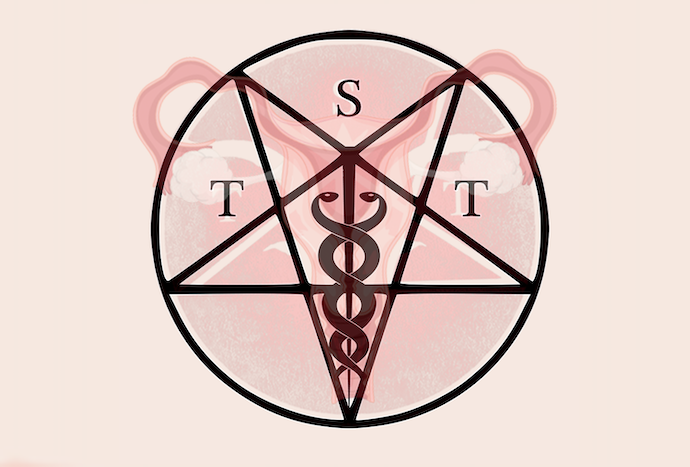Last week, The Satanic Temple (TST) introduced “the Satanic Abortion Ritual”—a ritual designed to provide religious support and comfort for women who’ve decided to get an abortion.
But the ritual has legal consequences as well as spiritual ones: TST claims that if abortion is incorporated into a religious ritual, then states with Religious Freedom Restoration Act (RFRA) laws must provide abortion on demand for Satanic women. Mandatory waiting periods or requirements such as reading anti-abortion literature, listening to fetal heartbeats, or viewing sonograms would violate the religious freedom of Satanic women by disrupting their sacred ritual.
As Jane Essex, Spokesperson for TST’s Religious Reproductive Rights Campaign puts it, “It would be unconstitutional to require a waiting period before receiving holy communion. It would be illegal to demand Muslims seek counseling prior to Ramadan.” Is TST sincere about sacralizing abortion or is this just a canny legal stratagem? And could this actually corner states with RFRA laws into granting abortion on demand?
Beginning in 2015, TST filed a series of lawsuits against the state of Missouri, claiming that the state’s requirements to receive an abortion amounted to unconstitutional religious indoctrination. Women must read an “informed consent” booklet that begins with the words (in bold) “The life of each human being begins at conception. Abortion will terminate the life of a separate, unique, living human being.”
They also claimed that subjecting TST members to these requirements violated their religious beliefs. Specifically, the third of TST’s Seven Tenets states that one’s body is inviolable and subject to one’s will alone. The fifth tenet states that beliefs should comport with science, and in TST’s view, Missouri’s informed consent literature is not based on science. Missouri also has a RFRA law meaning the state cannot burden anyone’s religion without demonstrating a compelling interest. The cases were dismissed but TST began thinking about what it would look like to give religious significance to abortion.
Contrary to the claims of TST’s detractors, TST does not see abortion as inherently sacred or a good unto itself. Rather, they seek to support women who are made to feel shame and humiliation for choosing to have an abortion. Mercy Maelica is a longtime TST leader and a mother herself. In fact, she said that part of the motivation for the work she does with TST is that she wants her children to see her fighting to make a difference.
She began receiving numerous communications from women who needed abortions and who had no resources—including spiritual resources. Maelica began working on a ritual that would support and affirm these women and also comport with the third and fifth tenets.
Maelica pointed out that although TST does not believe in the supernatural, they place great value on ritual to promote community and wellbeing. She joined a committee that included women who had chosen to have abortions to design the ritual.
The ritual spans the entirety of the pregnancy termination and includes the abortion itself. It involves the woman looking at herself in the mirror, and reciting a “rhythmic affirmation” asserting her autonomy and her decision. It’s described as a Satanic “destruction ritual”—in the sense that feelings of doubt and guilt are destroyed. According to TST co-founder Malcolm Jarry, the ritual has already been performed, although not in a state with abortion laws that would necessitate a legal challenge.
Jarry explained the ritual is not a put-on or a ploy, adding, “Everything we do, we do with sincerity.” In fact, for Jarry, if anyone is being insincere it’s states like Missouri that set up laws that make it logistically difficult, emotionally painful, and socially stigmatizing to have an abortion and then claim these restrictions are merely meant to provide “informed consent” before undergoing a medical procedure. “These laws are meant to instill shame in women seeking abortions,” said Jarry, “No one who is being earnest could dispute that.”
So what will happen when a state like Missouri burdens a TST member’s religion by interfering with their Satanic abortion ritual? It’s almost certain that the state would argue that the government has a compelling interest to make sure women are properly informed before receiving an abortion and that this interest trumps the religious freedom of Satanists.
But Jarry points out that the state would still have to prove these requirements actually serve that purpose and are not, in fact, pointless roadblocks designed to undermine a woman’s right to choose. The state would be forced to answer questions such as why states without these restrictions have better health outcomes. Thus, even in a worst-case scenario a lawsuit could become a platform where unstated agendas could be exposed and challenged for what they are.





